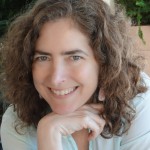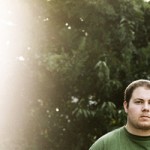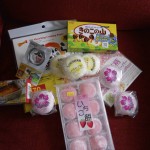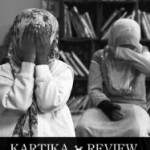 I am excited to have a guest post here from Diana Abu Jaber, an author I’d followed for a long time before we “met” on Twitter. I first read her lovely food memoir The Language of Baklava, then went backwards and read her novel Crescent. Animal lovers should definitely read her autobiographical essay “The Goddess of Flowers,” published in 2004. Diana’s writing has always been attentive, in the very best sense of the word. She pays thoughtful and generous attention to all of her characters and their settings and their actions. That thoughtful and generous attention can enliven the world; her writing helps to make me a more attentive writer and reader and person.
I am excited to have a guest post here from Diana Abu Jaber, an author I’d followed for a long time before we “met” on Twitter. I first read her lovely food memoir The Language of Baklava, then went backwards and read her novel Crescent. Animal lovers should definitely read her autobiographical essay “The Goddess of Flowers,” published in 2004. Diana’s writing has always been attentive, in the very best sense of the word. She pays thoughtful and generous attention to all of her characters and their settings and their actions. That thoughtful and generous attention can enliven the world; her writing helps to make me a more attentive writer and reader and person.
I was lucky enough to read an advance copy of her upcoming novel Birds of Paradise, coming out in September. I hope to share more about that book with you, either here or in a review elsewhere–it is one of her best, and one of the most satisfying novels I’ve read in a long time.
1. Did you go through an MFA program? If so, how was it structured?
DAJ: Confession: I teach in an MFA program, but I did not get one. When I was in graduate school, I knew I would need to teach in order to support myself, so I went for a Ph.D. I felt that it would give me the widest range of teaching options. And I actually tended to prefer attending literature classes to writing workshops. I wanted to be able to teach college literature, as well as to teach myself about my literary antecedents. It was a great opportunity to study writing from the inside out.
2. If you were to design your own private MFA for yourself—either before or after going through your own MFA program—what would it look like, and why? What would be your goals? How would you challenge yourself, solicit feedback, create a writing community?
My own private MFA program might look like the love child of Walden Pond and a Gertrude Stein salon. [TN: Wonderful, wonderful, wonderful.] Though I’d prefer a beachier setting—Key West, Provincetown, or the Bahamas. It would be a retreat sprinkled with conversations with a couple of working writers whom I trusted and respected. We’d hang out, maybe bake or eat or drink, maybe talk about writing, maybe not. Since we’re deep into my fantasy now, the writers would be people like Annie Proulx and Vladimir Nabokov. No more than two or so mentors total. There would be a Friday night dinner party that rotated among the homes of 7 or 8 other creative people—not limited to writers; possibly including painters, actors, dancers, critics. There would be long morning walks with a friend or a kid or a dog or myself. There would be a room with a great view. A balcony. Most of all, there would be stacks and stacks of reading—books by writers whose work I loved. Maybe a conversation once a month or less often with just one or two other people who were reading the same books. There would be the occasional cocktail party at some other person’s house—somebody wealthy, who could deal with the mess afterward.
3. Do you teach creative writing, or do you teach in an MFA program now? How do you measure student progress, or grading?
I teach in the MFA program at Portland buy ventolin State University. My grading is fairly intuitive and I tend to be compassionate. If I think you’ve done the work, you get a good grade. If you’re really engaged and writing a lot and commenting a lot and thinking about books and just sort of psyched about things, you totally get an A.
4. What is the most important thing that you try to teach your creative writing students, and why that? And how do you try to accomplish that goal?
We talk a lot about writing as a process and taking some of the pressure off of this idea of creating a product. It’s really hard to cope with that kind of end-thinking in this culture—we all want to be done with the work and to get our banana. The problem is, you may never get that damn banana. I try to help students learn to love and relax into the experience of being a writer. It’s like that Anne Lamott quote about how writing just to get published is like doing the Japanese tea ceremony just to get the tea. I try to nudge students to take imaginative and emotional risks, leaps, to mentally journey in their readings and writings. Maybe the best thing I can do for them is show them what a working writer’s life looks like. I talk about my process, my struggles, the highs and lows. Once I brought the mock up of a brand new book cover in to show them and we talked about the rollercoaster of bringing out a publication.
5. What have you read lately that’s just blown you away?
I really loved the detail and sensibility of [Gabrielle Hamilton’s memoir] Blood, Bones, and Butter, and the narrative voice(s) of Super Sad True Love Story [a novel by Gary Shteyngart]. And the poetry of brain research in [Richard Powers’s novel] The Echo Maker.
6. What are you working on now? Do you have anything coming out? Can you say a little bit more about it here?
My new novel is a bit of a family saga, called Birds of Paradise ,and it’s coming out this September. I got to go deep into the Miami landscape and really examine a lot of my own feelings about my adopted city. The family in the novel is devastated when the 13 year old daughter runs away, and the mother, who’s a mad pastry chef, disappears into work. A lot of my own obsessions are there—baking, organic food, anxieties around parenting, the shrieking of neighbors’ captive tropical birds—and I just really let myself chase them down, take a long, hard look at it.
The book I’m working on now doesn’t have a name yet but it’s a follow up to The Language of Baklava, another food memoir. This one toggles between the development of my academic and artistic career, putting together a writing life, and the more recent choice—in my forties—to become a parent. This book is a new kind of challenge for me because it’s a more grown up memoir about being accountable for your decisions—I’m trying to own up to the ways I may have backed down from things—while constantly trying to learn how to make life bigger, how to get a little braver. Creative self-excavation. With recipes.
Many thanks, Diana! Sign me up for your MFA program, too!








